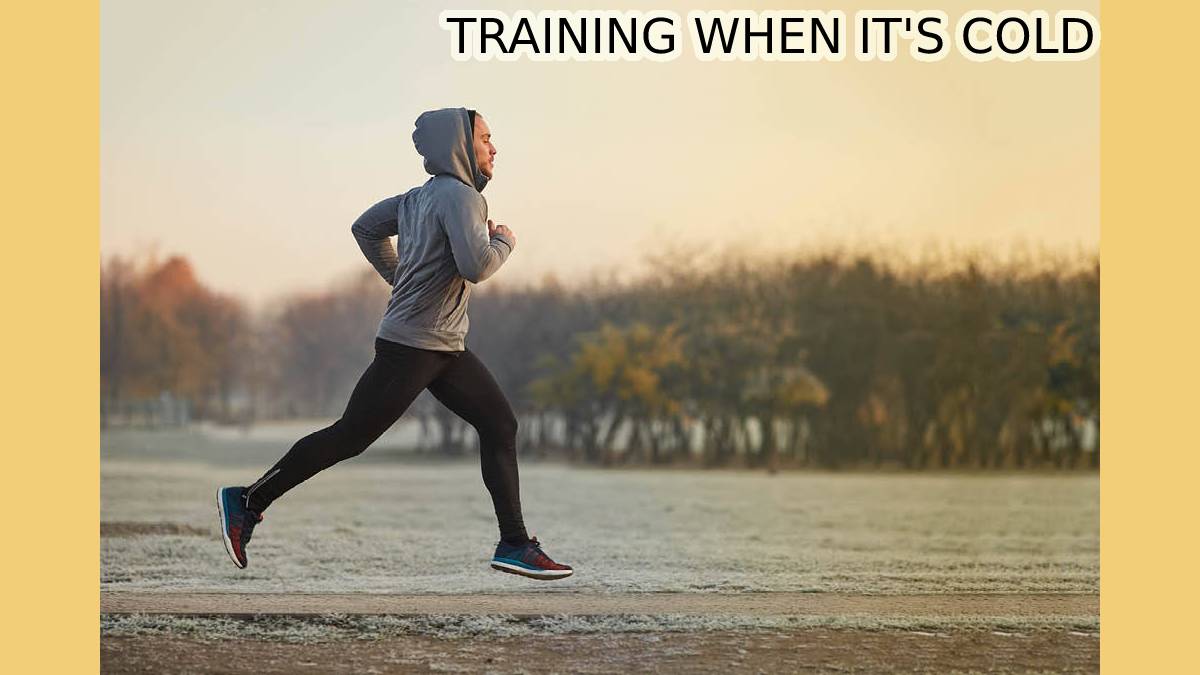TRAINING WHEN IT’S COLD – You did not imagine that winter would come so quickly, right? And yes! You will find that warming up is more essential than ever to prepare your body for cold weather. Playing sports when it’s hard isn’t always easy, especially when you need to be motivated to cope with the seasonal temperature, even if some are fans of sports in cold weather. So, is it a good or a bad idea to practice physical activity in winter?
Table of Contents
THE COLD: A SOURCE OF BENEFITS FOR YOUR BODY
FOR THE BODY…
Anyone can play sports outdoors when it’s cold; there are no contraindications whether it’s an endurance sport (running, trail running, fast walking, etc.), muscle-strengthening exercises (laps, squats, sit-ups, etc.), or even an outdoor sport like horseback riding, athletics, or soccer. When the body is in motion, the muscles heat up and produce a lot of heat, which allows the body to learn to regulate itself. The colder it is, the more energy your body expends to maintain its internal temperature at 37 degrees, causing your body to rehab without realizing it entirely.
… AND FOR THE MIND
What are the benefits for your body and your health in winter temperatures? First, playing sports outdoors in cold weather will improve blood circulation and increase heart activity. So doing physical activity and sports, especially during the winter when the days are shorter, is essential to maintain a good mood and promote the development of self-esteem. This is called “green therapy.” Finally, those of you who understand “running” when it comes to outdoor sports know that running in cold weather is a great way to burn calories because the hard releases toxins from the body, which removes some bad fats.
WHAT ARE THE RISKS OF PLAYING SPORTS IN COLD WEATHER?
NOT WARMING UP BEFORE YOUR WORKOUT
Warming up is essential to avoid subsequent health problems. In winter, the ligaments, tendons, and joints are more sensitive because they lose elasticity due to the cold. Therefore, you have to be more attentive to the preparation steps before practicing your sport outdoors, whatever it is, and the intensity during physical exercise.
MUSCULAR AND VASCULAR RISKS
Also, the diameter of our blood vessels decreases to prevent heat loss. Therefore, our muscles receive less water, which increases the risk of injury, especially muscle injuries. In addition, the risk of heart attack due to heat shock is significant beyond the age of 40 and remains a danger for all people with heart failure regardless of age. On the respiratory side, physical activity such as running in the cold at too high an intensity can cause asthma in the athlete, triggered by an excessive effort of the lungs to compensate for the cold that felt outside and the inspired air quality while running.
OUR TIPS FOR EXERCISING SERENELY WHEN IT’S COLD
KEEP A REGULAR RHYTHM
More than ever in winter, it’s essential to keep a regular pace when training outdoors—taking into account your warm-up time and your recovery time, always in line with the session’s objectives. Seek advice from those around you that. Like you do an activity outside in cold weather, can motivate you even more. Also and maybe you will find ideas to maintain a constant rhythm.
EQUIP YOURSELF WELL
Beyond physical preparation, playing sports in cold weather requires preparation in terms of clothing. Clothing an important, it should chose according to the biological activity and the intensity of the effort. Consider wearing flexible clothing to feel comfortable. Cover the body’s extremities well, and you will not die of heat with a pair of breathable gloves to practice resistance sports, for example! When we know that ⅔ of body heat loss comes from poorly protected extremities, we realize the need for well-covered extremities. Being well equipped also means ensuring a suitable body temperature and preventing your heart from overexerting itself.
INCREASE HEATING TIME
We advise you to do complete heating when it is winter. Warming up is essential to prepare the body for the effort, especially in a cold season. Start by warming up your entire body, then perform warm-up exercises targeting the muscles you’ll use during your workout. For example, if you have a stationary bike, you can finish your warm-up by pedaling for 5 to 10 minutes.
HYDRATE WELL
It’s often thought that it’s necessary to drink more in summer due to the hot weather, it’s true, but not only in summer. Good hydration is essential every day, and more so if you practice physical activity either in summer or winter. When it is freezing, in autumn or winter, drinking water is essential because the cold accentuates dehydration.
If you want to start playing an outdoor sport for safety reasons, ask your doctor for advice on your ability to cope with the cold in winter. Although the risks explained above are not general, remember that it is better to be safe than sorry.


